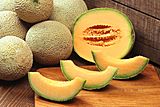Cantaloupe facts for kids
Quick facts for kids Cantaloupe |
|
|---|---|
 |
|
| Ripe North American cantaloupes (C. m. reticulatus) | |
| Scientific classification | |
| Kingdom: | |
| Division: | |
| Class: | |
| Order: | |
| Family: | |
| Genus: |
Cucumis
|
| Species: | |
| Subspecies: |
C. m. cantalupensis
C. m. reticulatus |
| Trinomial name | |
| Cucumis melo cantalupensis Cucumis melo reticulatus Naudin.
|
|
A cantaloupe is a sweet and juicy fruit that many people enjoy. It's also called a rockmelon in some places. Cantaloupes are a type of muskmelon, which means they are related to other melons like watermelon. You can find two main kinds: European and North American. These fruits can be quite different in size, from about half a kilogram (1.1 pounds) to a large 5 kilograms (11 pounds)!
Contents
Exploring Cantaloupe Varieties
There are two main types of cantaloupe, and they look a bit different:
- European Cantaloupe: This type often has an oblong (oval) shape. Its skin is usually a light green color.
- North American Cantaloupe: This kind is typically round. It has a thin, light brown skin that often has a net-like pattern. Inside, the fruit's flesh is firm, bright orange, and very sweet.
Cantaloupe and Your Health
| Nutritional value per 100 g (3.5 oz) | |
|---|---|
| Energy | 141 kJ (34 kcal) |
|
8.16 g
|
|
| Sugars | 7.86 g |
| Dietary fiber | 0.9 g |
|
0.19 g
|
|
|
Protein
|
1.84 g
|
| Vitamins | Quantity
%DV†
|
| Vitamin A equiv.
beta-Carotene
|
21%
169 μg
19%
2020 μg |
| Thiamine (B1) |
4%
0.041 mg |
| Riboflavin (B2) |
2%
0.019 mg |
| Niacin (B3) |
5%
0.734 mg |
| Pantothenic acid (B5) |
2%
0.105 mg |
| Vitamin B6 |
6%
0.072 mg |
| Folate (B9) |
5%
21 μg |
| Vitamin B12 |
0%
0.00 μg |
| Vitamin C |
44%
36.7 mg |
| Vitamin E |
0%
0.05 mg |
| Vitamin K |
2%
2.5 μg |
| Minerals | Quantity
%DV†
|
| Calcium |
1%
9 mg |
| Iron |
2%
0.21 mg |
| Magnesium |
3%
12 mg |
| Phosphorus |
2%
15 mg |
| Zinc |
2%
0.18 mg |
| Other constituents | Quantity |
| Water | 90.15 g |
| Alcohol (ethanol) | 0 mg |
| Caffeine | 0 mg |
| †Percentages estimated using US recommendations for adults. | |
Cantaloupes are a great source of vitamin C. This vitamin is super important for your body, helping your immune system stay strong and keeping you healthy.
Keeping Cantaloupes Safe to Eat
It's very important to wash cantaloupes well before you cut into them. This is because sometimes, bacteria can be on the outside of the fruit. If you don't wash it, these bacteria could get onto the part you eat. For example, in 2011, some people in the United States became sick from listeria bacteria found on cantaloupes. Always make sure to wash your fruits and vegetables carefully!
Images for kids
-
Close-up picture of the skin of a North American cantaloupe
See also
 In Spanish: Cantalupo para niños
In Spanish: Cantalupo para niños
 | Leon Lynch |
 | Milton P. Webster |
 | Ferdinand Smith |



